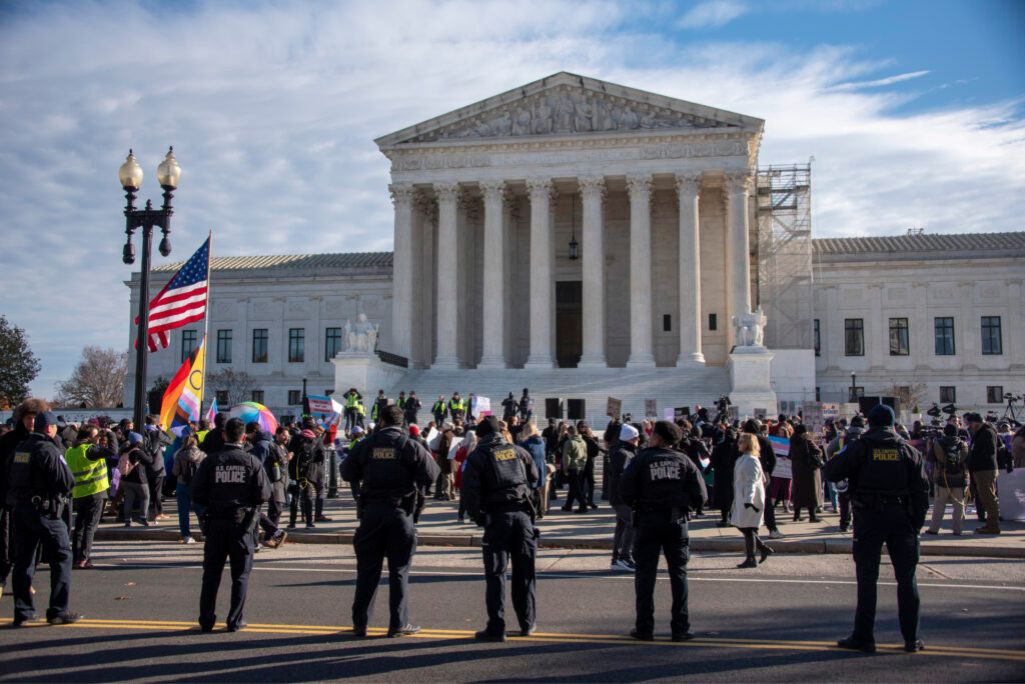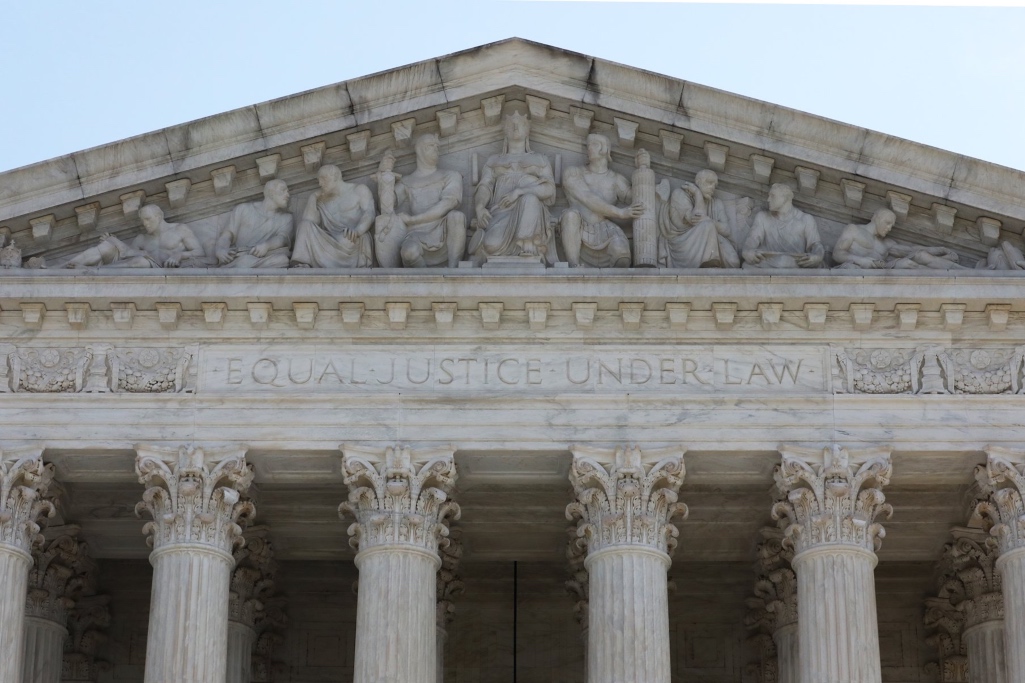
WASHINGTON (BP) — The Supreme Court heard oral arguments Dec. 4 in United States v. Skrmetti, a case which will determine the constitutionality of a Tennessee law banning gender transition procedures or so-called “gender affirming care” for minors.
The case involves three transgender teenagers and the Biden administration suing Tennessee officials in order to bar the state from enforcing the ban. Tennessee Attorney General Jonathan Skrmetti is named as the defendant in the case.
The law in question, Senate Bill 1 (S.B. 1), prevents health care providers from prescribing medication or performing procedures on minors in order to “transition” them to an identity opposite of their biological sex.
The legislation, passed March 1, 2023, required doctors to cease all current gender treatments on minors by March 31, 2024.
The High Court’s ruling on the ban could affect similar laws currently enacted by another 25 states. New Hampshire will become the 26th state on Jan. 1, 2025.
“The Supreme Court’s decision will have a monumental impact on the safety and security of children vulnerable to a harmful gender ideology, not just in the state of Tennessee, but across the nation,” said Brent Leatherwood, president of the Southern Baptist Convention’s (SBC) Ethics & Religious Liberty Commission (ERLC) in an October press release.
“Harmful procedures like hormone therapy, puberty blockers and surgery impose lifelong, devastating consequences on their well-being.”
The ERLC, in conjunction with the Tennessee Baptist Mission Board, previously filed an amicus brief in the case supporting the Tennessee law.
The brief, filed in October, was one of 50 amicus briefs filed on the side of the defendants, while just over 30 amicus briefs were filed supporting the plaintiffs.
In arguments lasting over two hours, attorneys for both the challengers and the defense presented arguments to the justices.
Elizabeth Prelogar, solicitor general of the U.S., spoke on behalf of the Biden administration in the case.
“This case is about access to medications that have been safely prescribed for decades to treat many conditions, including gender dysphoria,” Prelogar said. “But S.B. 1 singles out and bans one particular use. In Tennessee, these medications can’t be prescribed to allow a minor to identify with or live as a gender inconsistent with the minor’s sex.
“It doesn’t matter what parents decide is best for their children. It doesn’t matter what patients would choose for themselves. And it doesn’t matter if doctors believe this treatment is essential for individual patients. S.B. 1 categorically bans treatment when and only when it’s inconsistent with the patient’s birth sex.”
The law would apply equally regardless of sex, and the discrimination component of the solicitor general’s argument is based on the Court’s 2020 Bostock decision, which reinterpreted sex-based discrimination to include gender identity.
The three transgender teenagers in the case, along with their parents and the American Civil Liberties Union (ACLU), originally filed their lawsuit alleging Tennessee violated the Equal Protection Clause and the Due Process Clause of the 14th Amendment.
The Biden administration’s Department of Justice then joined the suit arguing the U.S. has a vested national interest in preventing the law from taking effect.
The plaintiffs alleged the law intentionally targets transgender individuals and is therefore sex-based discrimination that interferes with the parents’ ability to make medical decisions for their children.
The Tennessee District Court previously ruled that the plaintiffs did not have legal right to challenge the ban on gender-transition surgeries because they had not indicated that they wanted to undergo such procedures.
The challengers then went to the Supreme Court, which announced in June that it would hear the case.
“S.B. 1 regulates by drawing sex-based lines and declares that those lines are designed to encourage minors to appreciate their sex,” Prelogar continued in her opening arguments.
“The law restricts medical care only when provided to induce physical effects inconsistent with birth sex.
“The Sixth Circuit never considered whether Tennessee could justify that sex-based line. Because the Equal Protection Clause requires more, this Court should remand so that S.B. 1 can be reviewed under the correct standard.”
Matthew Rice, solicitor general for the state of Tennessee, said in his opening arguments that the state’s law is not discriminatory and instead focuses on banning the use of the medications and procedures on minors for safety or medical reasons.
“Tennessee lawmakers enacted S.B. 1 to protect minors from risky, unproven medical interventions,” Rice said. “The law imposes an across-the-board rule that allows the use of drugs and surgeries for some medical purposes but not for others. Its application turns entirely on medical purpose, not a patient’s sex. That is not sex discrimination.
“Just as using morphine to manage pain differs from using it to assist suicide, using hormones and puberty blockers to address a physical condition is far different from using it to address psychological distress associated with one’s body.
“The Equal Protection Clause does not require the states to blind themselves to medical reality or to treat unlike things the same, and it does not constitutionalize one side’s view of a disputed medical question.”
Rice went on to mention that some of these so-called gender affirming procedures have been restricted in half of the country’s states and in several other countries around the world because of the danger they present.
The attorneys then faced questions from the justices, who seemed to lean on the side of upholding Tennessee’s ban.
A majority of the six conservative justices seemed skeptical of the arguments presented by the challengers, while the three liberal justices seemed to side with the challengers.
As the ERLC previously explained, the case may be heavily influenced by the Supreme Court’s decision in the case of Bostock v. Clayton County, which ruled that the definition of “sex” under Title VII of the Civil Rights Act includes sexual orientation and gender identity.
The challengers invoked the 2020 ruling in Bostock v. Clayton County, while Tennessee relied on the court’s Dobbs decision in 2022 that ended nationwide protections for abortion and returned the issue to the states.
Leatherwood affirmed Rice’s arguments and called on the High Court to uphold Tennessee’s law banning the dangerous procedures for minors.
“Today’s oral arguments highlighted exactly why Tennessee’s law is so needed,” Leatherwood said.
“As Tennessee’s Solicitor General pointed out, these novel and experimental treatments often leave children infertile and with permanently damaged bodies. Given those harmful effects, it is not only entirely appropriate, but constitutionally permissible, for the state to intervene to protect these vulnerable minors. They need care and compassion, not a radical remaking of their bodies.
“While one can never draw a direct line from the questioning of the justices to the ultimate result, it was evident to everyone in the courtroom that a majority of the Court was skeptical of the U.S. government’s arguments. Tennessee’s law is good and just — and the Supreme Court should reject this challenge from the ACLU and the Biden Administration.”
A decision in the case will likely come in May or June of 2025.
(EDITOR’S NOTE — Timothy Cockes is a writer in Nashville.)


